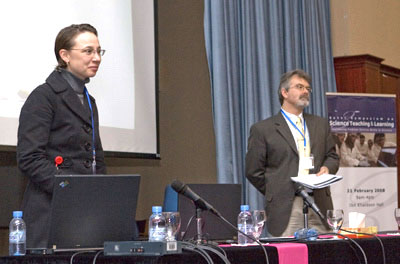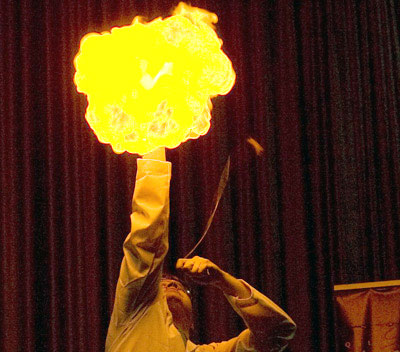Engaging students in science
February,2008

Dr. Renee Richer and Dr. Kevin Smith: Developing problem solving
skills is key to success in science and medicine.
WCMC-Q and Qatar University (QU) joined forces on Thursday for the third annual Qatar Symposium on Science Teaching and Learning. The one-day event, held at Qatar University, provided a platform for science educators in Qatar and the region to come together and exchange ideas on how to increase problem solving skills in science.
Science faculty, staff and teaching assistants from WCMC-Q and QU participated in the symposium for the third year running, alongside partner institutions Virginia Commonwealth University School of the Arts in Qatar (VCUQ) and Texas A&M University at Qatar (TAMUQ).
Like the approaches to problem solving being discussed, the event was varied and dynamic, with oral and poster presentations, workshops, and breakout sessions, all designed to promote a problem-based approach to science education.
WCMC-Q pre-medical faculty moderated a number of the breakout sessions, covering various topics: Interdisciplinary Approaches in Problem Solving, chaired by Dr. Christopher Ogden, lecturer in biology; Problem Solving Skills in Applied Science, chaired by Dr. Kevin C. Smith, associate professor of organic chemistry; and Pedagogy of Critical Thinking chaired by Dr. Roger Hinrichs, professor of physics. Dr. Hinrichs also gave a talk entitled It's the Environment: Connecting How Students Learn to Where Students Learn.

TAMUQ's G. Robert Shelton shows the difference
between helium and hydrogen inflated balloons.
Both make the balloons rise but hydrogen explodes
when lit, helium is not flammable.
In addition, lecturer in biology in the Foundation Program, Dr. Renee Richer, spoke on Teaching Applied Thinking: Cells to Ecosystem. In her presentation, Dr. Richer discussed the different types of thinking required in scientific study - Critical, Creative, Applied - and asked how educators can best teach students to think in a way that will help them to learn and understand complex scientific concepts, the kind of concepts that are essential for a career in medicine.
"In education, applied thinking is critical to learning, as students need to be able to apply the knowledge they acquire, using it as a model to solve problems," Dr. Richer said.
During the question and answer session, Dr. Richer was asked how educators who themselves received a more traditional form of education can go on to help students adapt to a Western educational system. She highlighted the need for a gradual introduction to the material as well as to the system of scientific inquiry, while helping students to gain confidence and independence as they progress in their studies.
And Dr. Richer added that teaching problem solving skills at the earliest stage is valuable preparation for a medical degree.
The symposium, alongside other outreach activities, engages Qatar's community of science educators in the mission of WCMC-Q. By sharing information and experiences, faculty members are contributing to the process of equipping students, current and potential, with the tools they need to excel and become successful doctors.
